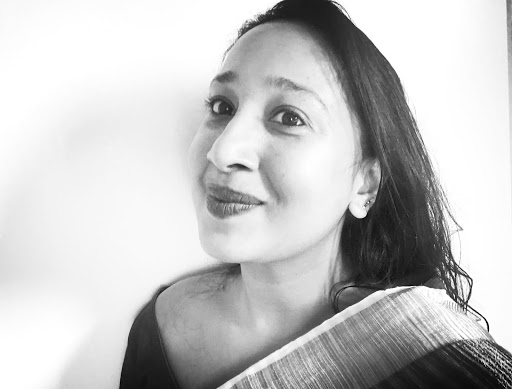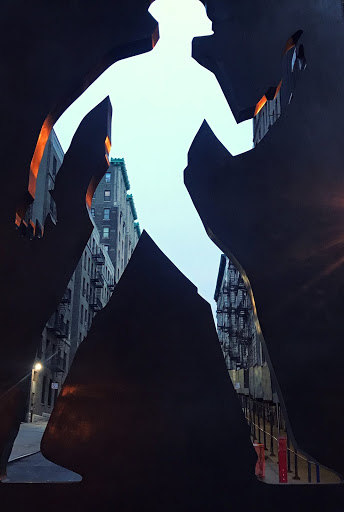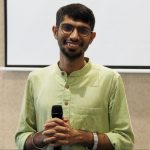I loved my fat-bellied, reddish greenish, mango clay bank that unfailingly grew heavier with coins each passing year. Those days, whenever the childish tantrums got the worst of me, I would cradle my treasure, pack two frocks in a polyethene bag, comb my hair into a ponytail and threaten my mother, “I am leaving home and going away.”
“How far?” she would ask.
“Seven seas and thirteen rivers,” I would declare, wiping away snot and tears. That was the precise measure of my inner conviction and I was utterly confident I could make it as long as I wore close-toed shoes to survive being stepped on.
And away I did go.
Propelled by divine grace, my father’s blessings, my mother’s prayers, hard work, some luck and ample jugaad, I traveled across seven seas and thirteen rivers away from Assam. As a journalist and a photographer, I followed my curiosity and imagination. I unwrapped many mysteries to marvel at the beauty; I stumbled upon the gory and the glory. From crawling inside coal mines in Meghalaya to being tear-gassed in Bangkok, from the kidnapping capital in the Philippines to the Honeymoon island in South Korea, I chased stories— precisely other’s stories.
Today, half-a-lifetime later I find myself in a moment of stillness. I turn around and look back. I see the coin-filled mango pulsating with determined ambition and indisputable innocence. I see the little girl who is still within me.
I hustled my way around the world, and now the merry-go-round has brought me back, to where it all started, the steps of my home, mango, coins and all. I firmly push aside the rose-tinted glasses of nostalgia and see the land of my mother as it is now. What I had left, a lilting distant melody.
I remember the spaces that humbled me. The bursting rallies, the ramshackle refugee camps, the stadium sized conference halls and minty cool classrooms. In these places I had paused to ask myself— I am not from here but here I am, now what? I have come to understand that my question was not a personal paradox rather it was the precipice of a quest, which in itself is a classic Indic enquiry. Who am I? Where am I? What am I doing here?
It was here that I met Raghu Ananthanarayanan, with whom I am studying the Yoga Sutras. He said, “The essential secret of the Upanishads is the insight that all learning takes place between the question and the answer.” As I ponder over my questions images of burning pyres from India overwhelmed by the pandemic makes me drop down numb, I am also wandering around New York City looking for a house—these questions of what I am doing and is my home here or there and where I should be—are reaching a melancholic crescendo.
As the thoughts race around, words of Raghu from the Yoga Sutra class come to me, “Learning about the self is like observing breathing- watching the outward movement of one’s psyche into the world, and drawing it back into quietude. And it is in these movements, pauses and the inner dialogues that accompany them, that the path unfolds”.
A decade old memory beckons. I find myself in a blue Maruti car, with windows that were permanently unrolled, cutting through January cold morning fog searching for the river gypsies along the Meghna River in Bangladesh. Gypsies who lived in boats that no longer sailed. For hundreds of years the Bedes or river gypsies as they are known cruised along intricate waterways while charming snakes, training monkeys, selling trinkets, and healing people upon the river banks. Rivers are life for the one-million strong community. As time flowed their elixirs and amulets had few takers, and their antics amazed no one. When the fine cracks on the boat became longer and its holes bigger, they tied their boats to bamboo poles, stuck to the waterbed and threw away their oars, never to sail again.
I met Halima, who rowed a small raft to take me to her two boats that housed eight members of her family. As my body swayed gently in tune with the wobbling boat, I took in the neatness of a one-room, tin-roofed ramshackle boat with two doors on two ends and two small windows with jute flaps. In one gusty leap I could reach the smaller boat which housed a mud oven kitchen. Water that seeped up through the cracks and the holes every day, Halima would bail out with a timeworn aluminum pot. Children frolicked in water, women washed clothes, and men rolled their beedis and bathed along with ducks under the crisp winter sun. The moss-green river was filled with purple water hyacinth.
Why not abandon these boats and settle down?
“We were born to be with the river,” Halima had said with a smile, that was at once proud and sad. And I joined her in that smile because that winter I owned no keys and everything I owned had to be a total of 20 kilos.
My body still remembers that swaying wobbliness upon those broken boats. I felt it once again, here in New York.
In search of a new home, I am rambling around seeking a slice of floor in the air. Brokers with crisp shirts trying to be my new best friend with a mouthful of tittle, tattle, prattle.
On one such tour, a broker explained he would show me the best apartment in the building, as it had a rare commodity, all-natural-light. It also had a kitchenette. All-steel. “Come on let’s get real, who cooks in New York?” The elevator kept rising along with his vivacious selling. “You are petite, all you need is a twin bed,” he tried to convince me. But when he suggested I could pay a small fee to rent a basement storage to put away my books, I just had to bat my eyes, hitting fours and sixes. All-over. I was convinced that the elevator was a vacuum cleaner and I had been sucked into it for an eternity, only to be released into a studio which had two sets of floor-to-ceiling glass walls, facing another building under construction. Like the offals of a city reminding me what it really means to live in a city. The apartment looked like it was steamrolled into a neat and tight hotel room. All-fizz. All-buzz. But if I could not imagine my library, plants and spices proliferating, how could I blossom? It had just enough space for me to lie down, which is all I wanted to do, because at that precise moment I got struck by a newly acquired, combined case of claustrophobia and vertigo.
Hopes unfurled, furled.
I also met an agent, who probed through my house-hunting misadventures with chuckling delight. “You should keep looking for an apartment because you must write about looking for an apartment,” he said in a voice as mild as milk.
Of course, I have lived in many itsy-bitsy places. Once, what I called home for nine months was a 300 square feet shipping container, where the shower water slithered on me like a wet noodle. That was in Juba, South Sudan, the world’s newest country. During those years of being a roving reporter, my 20 kilos of worldly possessions included many notes to self of what my home will be when I finally settle down. What is settling down? The day I buy a full set of knives and a Cadillac of a couch, which I did. But in New York, I have to constantly fight back to preserve my idea of a home.
When I first moved here, almost five years ago, I had crawled my way into a studio, only to realize after I moved in that the bathroom had no sink, but it was in what is called prime location in Manhattan. The helpless but hopelessly determined me found a ‘twin sink combo’ that was so smart that the “toilet and the sink communicated” and the sink water flowed through the faucet and the soapy water flushed the toilet. Despite endless DIY tutorials I could not convince myself to use that water. Instead, I decided to convince the 90-year-old landlady with a dog with two hair buns, to unleash me. This ended up with me having to claw my way out of that deal, which meant finding someone more desperate than me to take over the lease. When I posted an ad for the ‘cozy studio without a wash-basin’ more than three hundred people contacted me and about thirty showed up for the open house at lunch hour on a weekday.
Next I moved into a freshly renovated apartment, only to be told that there had been a fire in the apartment so the electricity could not be restored till after the weekend. Of course, my mother reminded me, “I told you, don’t move houses on Sundays, the Sun has no home.”
The building manager offered to put me up in a nearby hotel. That day I used the one word I thought I would never use. I mustered every ounce of American accent I had learnt and said it.
“Yo. No”
He moved me to a spacious apartment four floors up, which was almost renovated but not quite. But it is here I met Tula and Fabrizio, when I was burnt and oveready to keep firefighting against the deluge of real estate sharks and slumlords. In the nameless, faceless vortex of the building management system, I became friends with the maternal Tula and the spirited Fabrizio who became my local guardians.
I am perennially afraid of long-term contracts. My phone is still on a prepaid no strings attached plan. Therefore, I asked Tula if she would make an exception to consider a short-term lease. “Of course,” she said, without a question. She waived off even the 30-day notice period, so I can leave the day I find a new home. Fabrizio, the dynamic maintenance manager, became my speed-dial problem solver of all things Manhattan. And when I wanted to shift to the top floor, he gave me the keys to the new apartment and a month’s time to move. There I was, in possession of two apartments in New York for a month, moving at a leisurely pace, one plant at a time..
So, in an apartment with a month-to-month lease, is where I ended up staying for four years, breaking a decade-long record of not staying in any place for more than a year. Is it really the five floor walk-up building or is it Tula and Fabrizio that has kept me here? Or freedom?
Now, as I put aside yesterday’s sourness and start again each day with fat hope, the questions simmer. Is it size and shape that makes a place home; while in New York, should I not cook like New Yorkers? Is wanting light, space, and quiet asking too much? In seeking what seems right to me, am I not learning to accept the me who is seeking? Or will the home choose me?
It seems it is the season of turbulence, when it comes to the question of home. Because as I respond to the sympathies of friends who check on me and my family in India and absorb the collective helplessness of Indians in India and Indians elsewhere, I reflect on my feelings and wrestle with the question—In feeling what I am feeling and doing what I am doing, what am I really feeling or really doing?
If I think of India as home, then India is the experience of a family. Right now, my family is going through a crisis. The sheer scale and magnitude stun us into speechlessness. But the bigger crisis is the absence of the father in the crisis. Like a drunkard father abandons the family ruthlessly in pursuit of his desires and pleasure but comes home thundering and bellowing, breaking cups and plates, beating and shouting, berating even kind neighbors checking on us. Oh, how mighty is the rhetoric of the drunken hero and how infuriating. It is this denial of the crisis, it is this blaming, it is this self-serving machismo that makes children into responsible adults overnight, bent on rescuing the long-suffering silent family.
We, the children, can’t bear to see the mother (India) so helpless, bleeding, pleading, gasping. It shames us, it enrages us. Isn’t this the classic story of abusive homes, where the silence is finally broken when the teenager takes on the role of the adult, carries the plight of family on tender shoulders and declares he will do or die? The newly child turned man declares that he will be. This leads to frantic bravery, but can the young one really, truly solve everything and rescue all?
This is not an earth-shattering earthquake nor a tsunami, it is the plague that comes in waves after waves and outlasts seasons. It is years we are talking. Will we the children really be able to do what the head of the family or let’s just say it—our elected government is mandated morally and logistically to serve?
The images of burning pyres and suffering patients, the sharing of resources and pleas, the SOS messages, the news articles about guilt of the NRIs, what am I really supposed to do with it all? Am I supposed to share, share and share? What can my half-vaccinated, anxious self-supposed to really do? Yes, the media helps to rouse altruism, mobilize collective support and hopefully guilt the government and the world community into real action.
But how to sustain this altruism in the face of a long-running disaster? Can emotionally stressed, traumatized, sleepless children of an abandoned family be of any real help?
I took one good like at helplessness and set it aside and took stock of my inner and outer resources. I chose the distance, set the pace and drew a self-preserving parameter to form a loose community. I cut down news consumption to once a day. I muted groups. I made a list of people I can really check on. Then I do, not every day but regularly. I pause and take care of myself. I pray for all. I can’t afford to be a blazing martyr rather be a long-term warrior and if not, at least no one else needs to carry the burden of my burnt-out self.
All of these reflections make me acutely aware that I am seeking something I have lost. I have lost something inside the house, but I am searching for it outside on the street. So why am I looking outside, what I have lost inside? Because there is no light in the house, it seems to be my answer.
The answer to finding the light is expounded in chapter IV of the Brihadaranyaka Upanishad. Third Brahmana: The Light of the Man is the Self. King Janaka asked the sage Yājñavalkya, what is the source of the light that enables the world to function? Yājñavalkya explains, in total darkness, when one finds oneself without the sun, the moon or the fire and alone, “Your own self is the light. There is nothing else afterwards. You guide yourself, by yourself.”
I contemplate on what has happened to the light within myself. For that I had to first understand what the self is. It is this unshakeable longing to know oneself that led me to Antaranga Yoga and Sanskrit. It is by engaging with the inner work through Yoga that I realized that I had bubble-wrapped the self-guiding sense and bartered it for intellect. By sacrificing the power of intuitive interpretation at the altar of worldly intellectualism, I had traveled seven seas and thirteen rivers away from the source within.
The twists and turns that brought me to this moment where Raghu Ananthanarayanan is guiding me to use Patanjali’s Yoga Sutras as a mirror to contemplate on the self; my dialoguing with Jay Shankar on the Indic traditions, who has also challenged me to go beyond thoughtful meditations and write heartfelt reflections; and the enchanting journey of discovering the wonders of Sanskrit with Sampadananda Mishra are all stories for another day.
But at the threshold of this pursuit of the light, the tip of the arrow is focused on one question—what am I to me?
In other words, what is my swadharma?
And as Raghu reminds me, the real learning happens between the question and the answer, I am once again ready to embark on a voyage and this time it is deep within.

About the Author:
Bijoyeta Sahoriya Das is an Assistant Professor and Program Director of Journalism at LaGuardia Community College, City University of New York. Prior to joining CUNY, Das worked as a journalist, photographer and media trainer for more than a decade. She reported from South and Southeast Asia, Turkey and the US, writing for Al Jazeera, Deutsche Welle, Radio France, Radio Netherlands among others. She trained journalists and developed local media institutions in South Sudan for two years.
Das writes long-form narratives, literary features and short stories, and wrote a creative non-fiction biography of Haiti’s first woman prime minister. Her work is available at www.bijoyetadas.com.
Photo, New York City @Bijoyeta Sahoriya Das



 Priya is a Yoga therapist in the Krishnamacharya tradition. She adapts Reiki & energy work, Vedic chanting, life coaching & Ayurvedic practices in her healing spaces. She is committed to nurturing collectives that have the praxis of Yoga at their heart.
Priya is a Yoga therapist in the Krishnamacharya tradition. She adapts Reiki & energy work, Vedic chanting, life coaching & Ayurvedic practices in her healing spaces. She is committed to nurturing collectives that have the praxis of Yoga at their heart. Anisha has been on an exploration to understand herself through yoga for the last 15years which led her to teaching yoga, yoga therapy and inner work through yoga.
Anisha has been on an exploration to understand herself through yoga for the last 15years which led her to teaching yoga, yoga therapy and inner work through yoga. Apoorva chanced upon Yoga in her early 20s. A spark was lit within and there was no turning back. Her exploration led her to the Krishnamacharya tradition more than a decade ago. Curious about human behaviour and what drives it, she was thrilled when her search ended (and also began) when she first came upon the Yoga Sutra, which illuminated a path towards answering many questions that had been held for a long time.
Apoorva chanced upon Yoga in her early 20s. A spark was lit within and there was no turning back. Her exploration led her to the Krishnamacharya tradition more than a decade ago. Curious about human behaviour and what drives it, she was thrilled when her search ended (and also began) when she first came upon the Yoga Sutra, which illuminated a path towards answering many questions that had been held for a long time. Anita is a yoga teacher and therapist in the tradition of Sri.T.Krishnamacarya and Sri T.K.V. Desikachar, a Reiki practitioner and a Life Coach. She is also the founder of Vishoka, a center for learning Indic and energy-based frameworks for living and healing. Her deep concern for human suffering and the problems of unsustainable living kept her on the path of seeking an integrated approach to looking at life, living, learning and healing.
Anita is a yoga teacher and therapist in the tradition of Sri.T.Krishnamacarya and Sri T.K.V. Desikachar, a Reiki practitioner and a Life Coach. She is also the founder of Vishoka, a center for learning Indic and energy-based frameworks for living and healing. Her deep concern for human suffering and the problems of unsustainable living kept her on the path of seeking an integrated approach to looking at life, living, learning and healing. Ankit is a seeker in the wisdom traditions of India. The core of his work includes creating dialogic spaces where people can look within and see the connection between their inner and outer lives. Inspired by the likes of Gandhi, Aurobindo, Vivekananda and Guru Gobind his experiments in service took him back to his roots in Punjab where he is creating a community-led model of higher education which is open, inclusive and accessible for all. Ritambhara for him is a space for engaging in a community which is committed to a DHramic life. He anchors his work of learning and leadership in the Antaranga Yoga Sadhana and the humanistic wisdom of Mahabharata.
Ankit is a seeker in the wisdom traditions of India. The core of his work includes creating dialogic spaces where people can look within and see the connection between their inner and outer lives. Inspired by the likes of Gandhi, Aurobindo, Vivekananda and Guru Gobind his experiments in service took him back to his roots in Punjab where he is creating a community-led model of higher education which is open, inclusive and accessible for all. Ritambhara for him is a space for engaging in a community which is committed to a DHramic life. He anchors his work of learning and leadership in the Antaranga Yoga Sadhana and the humanistic wisdom of Mahabharata.
BEAUTIFUL!!!
You reflected the inner world of an evolving soul in such a simple and humble way!
absolutely loved your reflections Bijoyeta. Could get a glimpse of your interesting journey covering many countries.